Audi Q4 e-tron vs Kia EV4 Hatchback – Which car suits you better?
Compare performance, boot capacity, efficiency and price at a glance.
Find out which car is the better choice for you – Audi Q4 e-tron or Kia EV4 Hatchback?
Here’s where it gets real: The technical differences in detail
Costs and Efficiency: Price and efficiency are key factors when choosing a car – and this is often where the real differences emerge.
Kia EV4 Hatchback has a evident advantage in terms of price – it starts at 32200 £, while the Audi Q4 e-tron costs 39600 £. That’s a price difference of around 7337 £.
In terms of energy consumption, the advantage goes to the Kia EV4 Hatchback: with 14.90 kWh per 100 km, it’s minimal more efficient than the Audi Q4 e-tron with 15.90 kWh. That’s a difference of about 1 kWh.
As for range, the Kia EV4 Hatchback performs a bit better – achieving up to 625 km, about 71 km more than the Audi Q4 e-tron.
Engine and Performance: Power, torque and acceleration are the classic benchmarks for car enthusiasts – and here, some clear differences start to show.
When it comes to engine power, the Audi Q4 e-tron has a evident edge – offering 340 HP compared to 204 HP. That’s roughly 136 HP more horsepower.
In acceleration from 0 to 100 km/h, the Audi Q4 e-tron is evident quicker – completing the sprint in 5.40 s, while the Kia EV4 Hatchback takes 7.40 s. That’s about 2 s faster.
In terms of top speed, the Audi Q4 e-tron performs minimal better – reaching 180 km/h, while the Kia EV4 Hatchback tops out at 170 km/h. The difference is around 10 km/h.
There’s also a difference in torque: the Audi Q4 e-tron pulls decisively stronger with 679 Nm compared to 283 Nm. That’s about 396 Nm difference.
Space and Everyday Use: Whether family car or daily driver – which one offers more room, flexibility and comfort?
Both vehicles offer seating for 5 people.
In curb weight, the Kia EV4 Hatchback is slightly lighter – 1811 kg compared to 2035 kg. The difference is around 224 kg.
In terms of boot space, the Audi Q4 e-tron offers a bit more room – 535 L compared to 435 L. That’s a difference of about 100 L.
In maximum load capacity, the Audi Q4 e-tron performs hardly perceptible better – up to 1490 L, which is about 75 L more than the Kia EV4 Hatchback.
When it comes to payload, Audi Q4 e-tron somewhat takes the win – 515 kg compared to 459 kg. That’s a difference of about 56 kg.
All in all, the Audi Q4 e-tron shows itself to be wins the duel decisively and secures the title of DriveDuel Champion.
It impresses with the more balanced overall package and proves to be the more versatile companion for everyday use.
Audi Q4 e-tron
The Audi Q4 e-tron seamlessly combines sustainable driving with premium comfort, embodying the brand's commitment to electric mobility. Its sleek design and spacious interior create an inviting atmosphere, perfect for those who appreciate both style and practicality. With a focus on innovative technology, the Q4 e-tron offers a dynamic driving experience that appeals to modern drivers seeking eco-friendly alternatives.
details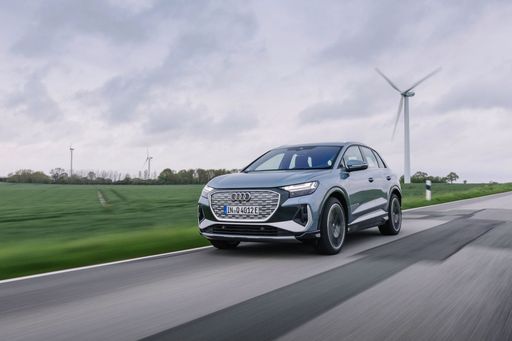 @ audi-mediacenter.com
@ audi-mediacenter.com
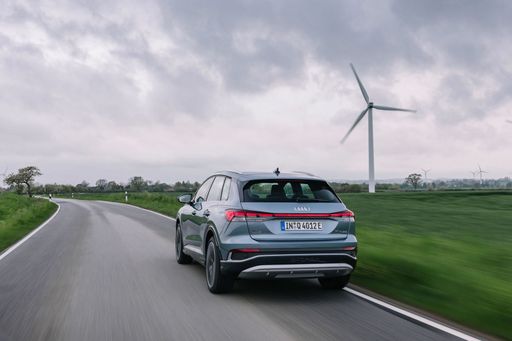 @ audi-mediacenter.com
@ audi-mediacenter.com
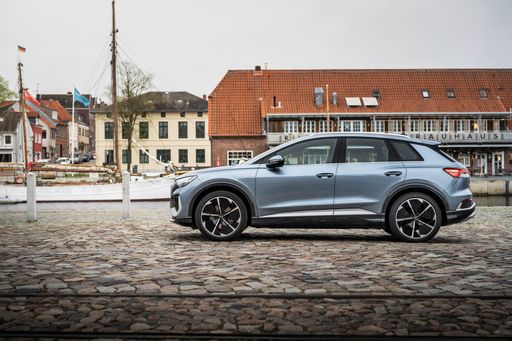 @ audi-mediacenter.com
@ audi-mediacenter.com
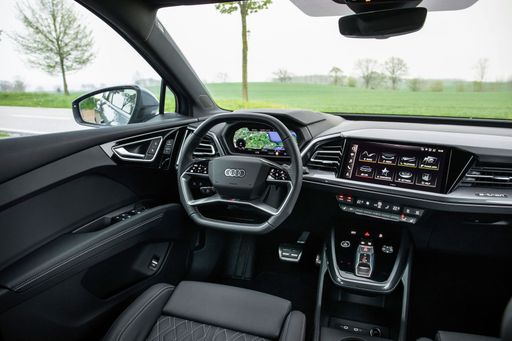 @ audi-mediacenter.com
@ audi-mediacenter.com
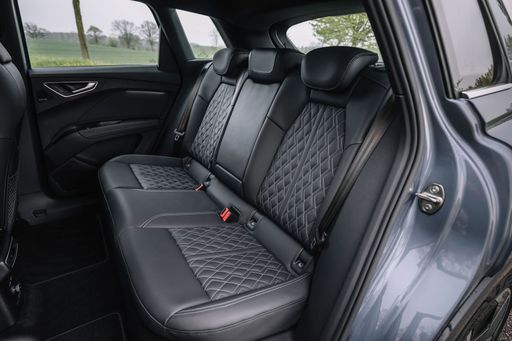 @ audi-mediacenter.com
@ audi-mediacenter.com
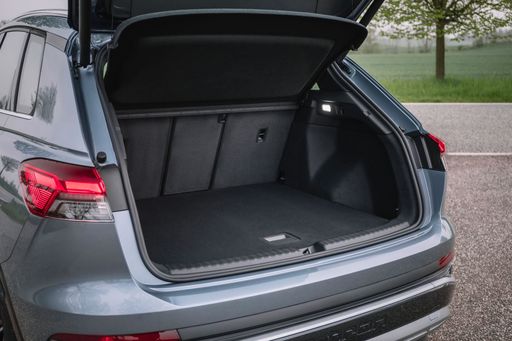 @ audi-mediacenter.com
@ audi-mediacenter.com
Kia EV4 Hatchback
The Kia EV4 Hatchback paves the way for a sleek and efficient driving experience, capturing attention with its modern design and eco-friendly performance. Built with comfort and sustainability in mind, this hatchback redefines electric mobility for urban explorers and suburban commuters alike. Inside, the EV4 boasts a spacious and tech-savvy interior, offering drivers and passengers a seamless blend of innovation and practicality.
details

|
|
|
|
|
Costs and Consumption |
|
|---|---|
|
Price
39600 - 58800 £
|
Price
32200 - 42400 £
|
|
Consumption L/100km
-
|
Consumption L/100km
-
|
|
Consumption kWh/100km
15.9 - 17.4 kWh
|
Consumption kWh/100km
14.9 - 16.2 kWh
|
|
Electric Range
406 - 554 km
|
Electric Range
440 - 625 km
|
|
Battery Capacity
59 - 77 kWh
|
Battery Capacity
58.3 - 81.4 kWh
|
|
co2
0 g/km
|
co2
0 g/km
|
|
Fuel tank capacity
-
|
Fuel tank capacity
-
|
Dimensions and Body |
|
|---|---|
|
Body Type
SUV
|
Body Type
Hatchback
|
|
Seats
5
|
Seats
5
|
|
Doors
5
|
Doors
5
|
|
Curb weight
2035 - 2235 kg
|
Curb weight
1811 - 1910 kg
|
|
Trunk capacity
520 - 535 L
|
Trunk capacity
435 L
|
|
Length
4588 mm
|
Length
4430 - 4450 mm
|
|
Width
1865 mm
|
Width
1860 mm
|
|
Height
1614 - 1632 mm
|
Height
1485 mm
|
|
Max trunk capacity
1460 - 1490 L
|
Max trunk capacity
1415 L
|
|
Payload
505 - 515 kg
|
Payload
445 - 459 kg
|
Engine and Performance |
|
|---|---|
|
Engine Type
Electric
|
Engine Type
Electric
|
|
Transmission
Automatic
|
Transmission
Automatic
|
|
Transmission Detail
Reduction Gearbox
|
Transmission Detail
Reduction Gearbox
|
|
Drive Type
Rear-Wheel Drive, All-Wheel Drive
|
Drive Type
Front-Wheel Drive
|
|
Power HP
204 - 340 HP
|
Power HP
204 HP
|
|
Acceleration 0-100km/h
5.4 - 8.1 s
|
Acceleration 0-100km/h
7.4 - 7.8 s
|
|
Max Speed
160 - 180 km/h
|
Max Speed
170 km/h
|
|
Torque
310 - 679 Nm
|
Torque
283 Nm
|
|
Number of Cylinders
-
|
Number of Cylinders
-
|
|
Power kW
150 - 250 kW
|
Power kW
150 kW
|
|
Engine capacity
-
|
Engine capacity
-
|
General |
|
|---|---|
|
Model Year
2023 - 2025
|
Model Year
2025
|
|
CO2 Efficiency Class
A
|
CO2 Efficiency Class
A
|
|
Brand
Audi
|
Brand
Kia
|
What drive types are available for the Audi Q4 e-tron?
The Audi Q4 e-tron is offered with Rear-Wheel Drive or All-Wheel Drive.
The prices and data displayed are estimates based on German list prices and may vary by country. This information is not legally binding.
